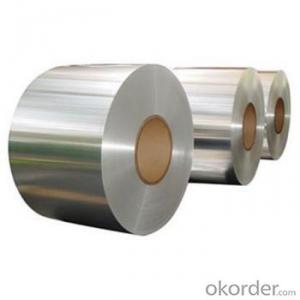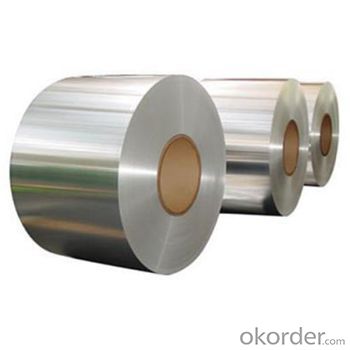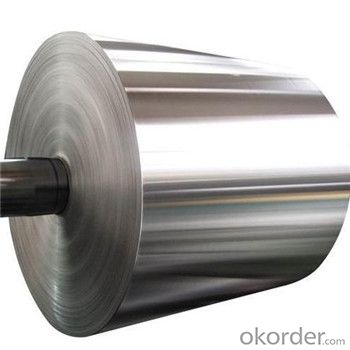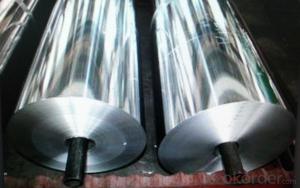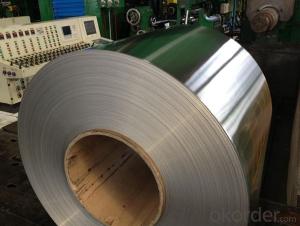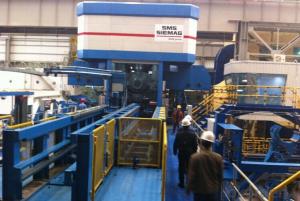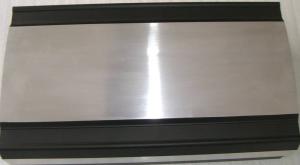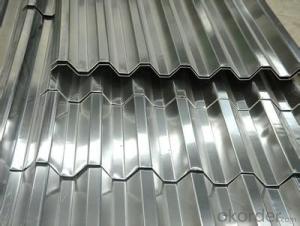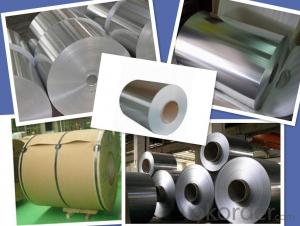4 X 12 Aluminum Metal Roof Sheets - Aluminium Foil Stock for Rolling
- Loading Port:
- China main port
- Payment Terms:
- TT OR LC
- Min Order Qty:
- 20 m.t.
- Supply Capability:
- 10000 m.t./month
OKorder Service Pledge
OKorder Financial Service
You Might Also Like
Specification
1.Specification of Aluminium Foil Stock Used for Aluminium Foil Rolling
Alloy: 1235/8011/8079/3003
Temper: H14/26/24/26
Thickness: 0.2mm-0.3mm
Width: 1000mm - 2100mm
Core I.D: 405/505/508/610mm
Surface: Surface is uniform and free of defeats, surface is free of aluminium oxide and carbon
Edge: Edge is properly trimmed and free of edge cracks
Flatness: Mill flatness coil having slight edge waviness rather than center buckles shall be acceptable
Rolling Performance: Re-rollable to final desired gauges
Standard: GB/T3198 / ASTM-B209
2. Features of Aluminium Foil Stock Used for Aluminium Foil Rolling
High manufacturing accuracy
Smooth surface
No waves
High strength of extension and yield
Well packaged
3. Application of Aluminium Foil Stock Used for Aluminium Foil Rolling
Our aluminium foilstock is widely used in the production of light gauge foil, pharmaceutical foil, household foil, container foil, lidding foil, finstock, cable foil and other heavy gauge foil.
4. Pictures
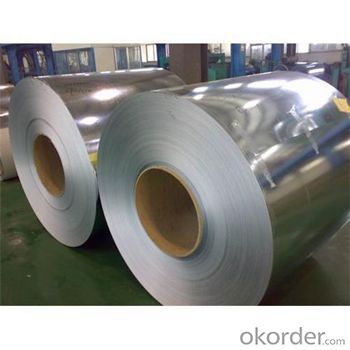
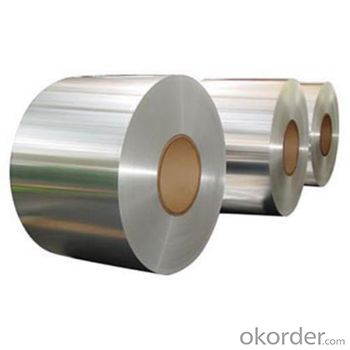
5.FAQ
1) How about your company?
A world class manufacturer & supplier of aluminum coil and alloy blanks. Aluminum production base is comprised of 18 aluminum annealers, 10 coil and foil mills, 4 continuous production lines, 2 hot rolling production line and 3 prepainted lines.
Export 5000 tons per month to Asia, America and Middle East. Always do the best for our clients.
2) Can you guarantee the quality of the products?
We are responsible for the quality of materials to get a long-term cooperation with clients in a reasonable period of time and we are glad to arrange and coordinate any third party inspection for you.
3) What is the delivery time after purchase?
35 day after receiving client’s deposit or correct LC
- Q: What are the different surface finishes for aluminum sheets in the construction industry?
- Some common surface finishes for aluminum sheets in the construction industry include mill finish, anodized finish, brushed finish, and powder coated finish.
- Q: What is the modulus of elasticity for aluminum sheets?
- The modulus of elasticity for aluminum sheets typically ranges between 69 GPa and 73 GPa.
- Q: This question asks for a comparison of the pros and cons of using aluminum sheets as a material for exterior walls in construction.
- <p>Aluminum sheets for exterior walls offer several advantages, including durability, low maintenance, and resistance to corrosion and weathering. They are lightweight, which can reduce the load on structures, and are recyclable, contributing to sustainability. Additionally, aluminum sheets can be easily shaped and painted, offering design flexibility. However, they have some disadvantages, such as being a poor insulator, which may require additional insulation for energy efficiency. They can also dent or scratch easily and may require more frequent replacement due to their lower resistance to impacts compared to materials like stone or brick. Furthermore, while they reflect heat well, they can also conduct cold, potentially leading to issues in extreme temperature conditions.</p>
- Q: Can aluminum sheet be used for electrical enclosures?
- Yes, aluminum sheet can be used for electrical enclosures. Aluminum is a popular choice for electrical enclosures due to its excellent conductivity, lightweight nature, and corrosion resistance. It provides effective shielding against electromagnetic interference and offers good heat dissipation properties. Additionally, aluminum is easily formable, allowing for the creation of complex shapes and designs. Overall, aluminum sheet is a suitable material for electrical enclosures and is commonly used in various industries including electronics, telecommunications, and power distribution.
- Q: The difference between aluminum plate and aluminum plate
- Aluminum row is aluminum profile! Cheapness! The manufacturing process is different. The performance of aluminum plate will be higher! I hope you can adopt it! Is there anything you'd like to inquire about?!The data from Suzhou Juteng Metal Technology Department
- Q: Can aluminum sheet be used for automotive body-in-white applications?
- Yes, aluminum sheet can be used for automotive body-in-white applications. Aluminum is lightweight, yet strong and durable, making it an ideal material for automotive applications. It offers a high strength-to-weight ratio, which helps improve fuel efficiency and overall vehicle performance. Additionally, aluminum's corrosion resistance properties make it suitable for withstanding harsh environmental conditions. Its formability allows for complex and intricate designs, enabling manufacturers to create lightweight yet rigid automotive structures. The use of aluminum in automotive body-in-white applications has become increasingly popular in recent years, as it helps reduce vehicle weight and emissions while maximizing safety and performance.
- Q: What are the different methods of surface treatment for adhesive bonding of aluminum sheet?
- There are several different methods of surface treatment for adhesive bonding of aluminum sheet. These methods can help improve the bond strength and durability of the adhesive joint. Some common methods include: 1. Mechanical Surface Treatment: This method involves roughening the aluminum surface using techniques such as sandblasting, abrasion, or wire brushing. The roughened surface creates a better mechanical interlock between the adhesive and the aluminum, increasing the bond strength. 2. Chemical Surface Treatment: Chemical treatments can be used to remove contaminants, oxidation, or corrosion from the aluminum surface. Common chemical treatments include acid etching, chromate conversion coating, or anodizing. These treatments improve the surface cleanliness and promote adhesion by creating a chemically reactive surface for the adhesive. 3. Plasma Treatment: Plasma treatment involves exposing the aluminum surface to a low-temperature plasma discharge. This process modifies the surface energy and removes contaminants, thereby enhancing the wettability and adhesion of the adhesive. 4. Primer Coating: Applying a primer coat on the aluminum surface can improve adhesion by promoting chemical bonding between the adhesive and the substrate. Primers are typically designed to promote adhesion to specific substrates and can enhance the bond strength and durability of the adhesive joint. 5. Surface Activation: Surface activation techniques, such as flame treatment or corona treatment, can be used to increase the surface energy of the aluminum sheet. These methods create free radicals on the surface, which improve the bonding characteristics of the adhesive. It's important to note that the selection of the surface treatment method depends on various factors like the specific adhesive used, the desired bond strength, the application requirements, and the condition of the aluminum surface. Therefore, it is recommended to consult adhesive manufacturers or experts to determine the most suitable surface treatment method for a specific adhesive bonding application.
- Q: Can 101 aluminum sheets be bonded to other materials?
- Indeed, it is possible to bond 101 aluminum sheets with other materials. Aluminum demonstrates remarkable versatility in its capability to be bonded with a vast array of substrates through diverse bonding techniques. Several commonly employed methods for bonding aluminum sheets to other materials comprise adhesive bonding, mechanical fastening, welding, and brazing. The selection of a specific bonding technique hinges upon factors such as the composition of the material to be bonded with aluminum, the desired strength of the bond, and the intended application. Nonetheless, it is crucial to ensure compatibility between the aluminum sheets and the other materials to guarantee the establishment of a robust and long-lasting bond.
- Q: This question asks for a comparison of the cost of aluminum sheets with other building materials.
- <p>Aluminum sheets are generally considered cost-effective compared to other building materials, especially when considering their long-term benefits. They are relatively inexpensive to produce and install, and their low maintenance requirements can save costs over time. However, their initial cost may be higher than some materials like wood or vinyl. Aluminum's resistance to corrosion and weathering means it lasts longer, which can offset the higher upfront cost. In contrast, materials like steel might be more expensive due to their weight and the cost of corrosion protection, while concrete and masonry are typically more costly for both materials and labor. The cost-effectiveness of aluminum can vary based on regional prices, specific project requirements, and the type of aluminum product (e.g., thickness, finish).</p>
- Q: why does aluminum sheet not react with sulfuric acid nut react with hydrochloric acid?
- aluminum reacts with hydrochloric acid,generating aluminium chloride which can dissolve in water. but aluminum reacts with sulfuric acid, generating aluminum sulfate which can't dissolve in water and will generate aluminum sulfate, a layer of protective film, preventing aluminum from reacting with sulfuric acid, so there is no significant phenomena.
Send your message to us
4 X 12 Aluminum Metal Roof Sheets - Aluminium Foil Stock for Rolling
- Loading Port:
- China main port
- Payment Terms:
- TT OR LC
- Min Order Qty:
- 20 m.t.
- Supply Capability:
- 10000 m.t./month
OKorder Service Pledge
OKorder Financial Service
Similar products
Hot products
Hot Searches
Related keywords
